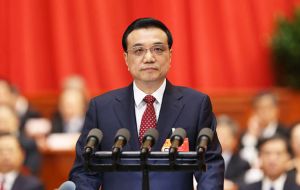MercoPress. South Atlantic News Agency
China lowers 2015 growth estimate to 7%; in 2014 expansion was the slowest in 24 years
 The economic growth target for 2015 was delivered by Premier Li Keqiang to the third session of the 12th National People's Congress (NPC).
The economic growth target for 2015 was delivered by Premier Li Keqiang to the third session of the 12th National People's Congress (NPC). Shares in China fell after the country's government set its official growth target at 7% for this year. The rate is lower than last year's target of 7.5%, which China missed after it grew at the slowest pace in 24 years. The Shanghai Composite closed down 1% at 3,248.48, while Hong Kong's Hang Seng ended 1.1% lower at 24,193.04.
The Chinese government also announced that a trial of a trading link between its Shenzhen and Hong Kong stock markets would be launched at an “appropriate time”.
The move comes after a link between the Shanghai and Hong Kong stock exchanges was established in November - allowing investors to trade stocks on both exchanges.
However despite markets' reactions China's decision to lower the growth target for 2015 was a reasonable step, according to European expert on Chinese studies, Duncan Freeman.
“For the Chinese government the key issue should not be short-term growth rates but long-term reform policies to deal with underlying problems,” said Freeman, a research fellow at Brussels Institute of Contemporary China Studies.
Freeman said that domestic factors such as the weakness of the real estate sector will make it difficult for China to maintain strong growth, and the poor performance of many major foreign markets will limit external demand.
“Although growth will be slower, it will still represent significant demand both internally and internationally,” he said.
China unveiled its economic growth target for 2015 Thursday in a government work report delivered by Premier Li Keqiang to the third session of the 12th National People's Congress (NPC).
The target was lowered to “around 7%,” a level not seen since 2004 and 0.5 percentage points lower than that of 2014.
Rajiv Memani, Chairman of Global Emerging Markets Committee of Ernst & Young, was also positive about China's economic stability against the backdrop of a slower growth rate.
“Given China's increasing dominance in the global economy, it was understandable that any reduction in growth would be watched intensely” said Memani, adding China was prudently balancing itself towards a consumption-based economy, from an export-oriented economy, with a strategic focus on innovation.
“Given Beijing's goal of restructuring their economy - less reliant on manufacturing and more reliant on services - moderate economic growth is not a bad thing in the longer term. In this scenario it's important to focus on the quality - job creation and wage growth remain relatively stable - and not just the speed, of the economy,” said Memani.
Memani said the growth numbers on its face may appear to be on a lower side, but in real terms this growth has been much better compared to previous years.




Top Comments
Disclaimer & comment rules-

-

-

Read all commentsHmm! What about the projected economic growth through investment in Argentina?
Mar 06th, 2015 - 06:30 pm 0Surely they factored that in to the figures?
When China implodes its going to be really ugly.
Mar 06th, 2015 - 07:04 pm 0I snicker every time I see articles that confirm what I said and I went round and round with other posters on this board a year or two ago.
China perhaps is trying to expand to far to quickly ,
Mar 06th, 2015 - 08:11 pm 0I think she will overstretch herself , and have to start withdrawing her expansionist ambitions,
all bubble burst or deflates in the end.
Commenting for this story is now closed.
If you have a Facebook account, become a fan and comment on our Facebook Page!